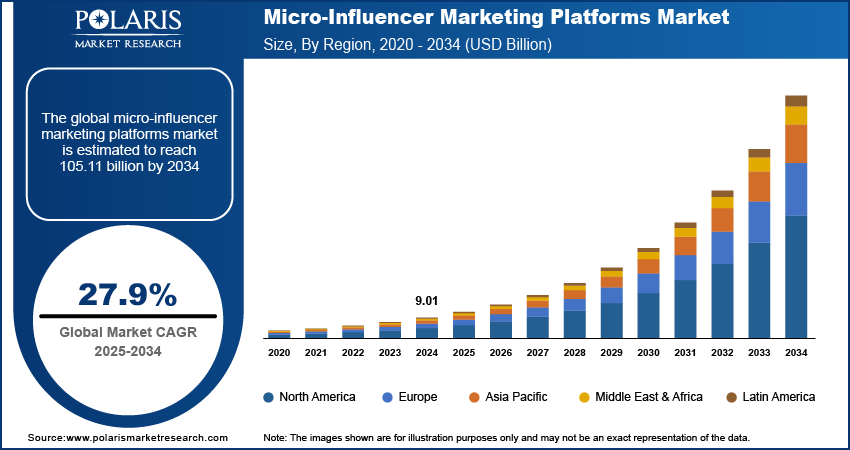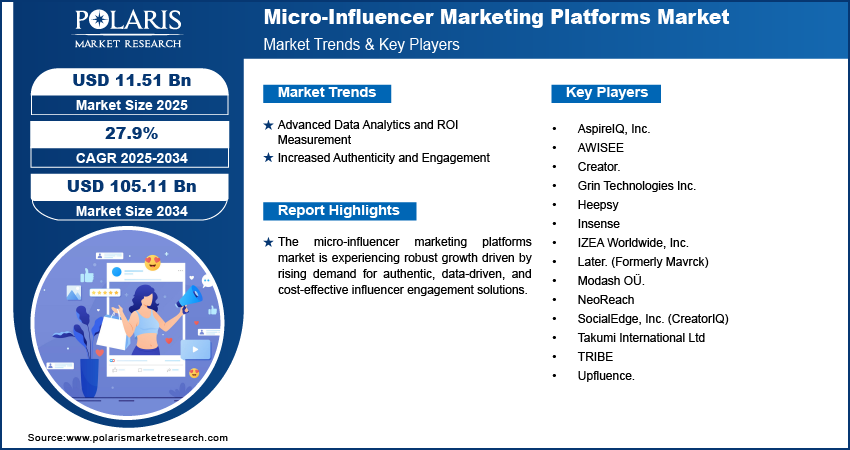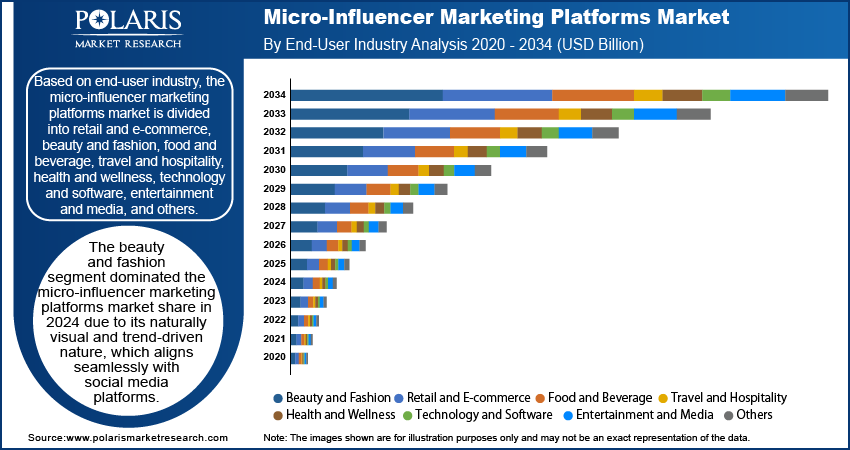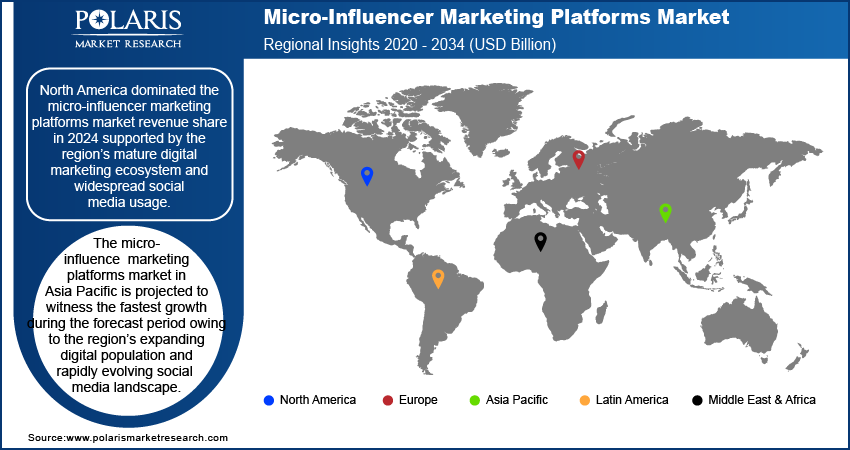
Micro-Influencer Marketing Platforms Market Size, Share, Trends, Industry Analysis Report
: By Platform Features, Deployment Model, Business Model, End-User Industry (Retail and E-commerce, Beauty and Fashion, Food and Beverage, Travel and Hospitality, Health and Wellness, Technology and Software, Entertainment and Media, Others), and Region (North America, Europe, Asia Pacific, Latin America, and Middle East & Africa) – Market Forecast, 2025–2034
- Published Date:May-2025
- Pages: 129
- Format: PDF
- Report ID: PM5578
- Base Year: 2024
- Historical Data: 2020-2023
Micro-Influencer Marketing Platforms Market Overview
The global micro-influencer marketing platforms market size was valued at USD 9.01 billion in 2024. It is expected to grow from USD 11.51 billion in 2025 to USD 105.11 billion by 2034, at a CAGR of 27.9% during 2025–2034.
Micro-influencer marketing platforms are digital solutions that connect brands with influencers having a subtle yet highly engaged follower base, typically ranging from 1,000 to 100,000. These platforms have gained traction due to their ability to offer cost-effective and scalable marketing solutions. Unlike traditional celebrity endorsements or macro-influencer partnerships, micro-influencer campaigns typically demand lower financial investments, allowing brands, particularly small and medium enterprises, to launch multiple simultaneous campaigns without overextending budgets. This affordability, paired with the ability of platforms to automate processes such as influencer discovery, content approval workflows, and performance tracking, ensures that brands can scale their outreach efficiently across various demographics and geographies.

To Understand More About this Research: Request a Free Sample Report
The micro-influencer marketing platforms market growth is driven by their capability to facilitate access to targeted niche audiences. Micro-influencers often have a deep connection with their communities, fostering higher trust and authenticity in their recommendations. These platforms allow brands to identify influencers whose content and audience align precisely with their target segments, whether it be health and wellness, tech, fashion, or other verticals. The rise of micro-influencers has been particularly notable due to rapidly growing screen time on social media platforms. A 2024 NCBI report illustrates this trend, noting that TikTok reached 1 billion monthly active users by September 2021, with over 90% of its influencers being micro-influencers. Specifically, 66.96% have 1,000–10,000 followers and 23.06% have 10,000–50,000 followers, highlighting the platform's dominance in grassroots content creation. This precision enables campaigns to send personalized messages, boosting engagement and conversion rates. Consequently, brands are reaching micro-influencers on these platforms for greater visibility and to build deeper relationships within niche markets.
Micro-Influencer Marketing Platforms Market Dynamics
Advanced Data Analytics and ROI Measurement
Advanced data analytics and ROI measurement platforms integrate robust analytics tools that track key performance indicators such as engagement rates, audience reach, click-through rates, and conversion metrics in real time. In December 2024, Dentsu launched Dentsu Influence, a data-driven influencer marketing approach combining precision analytics, creative strategy, and performance measurement. The solution expands Dentsu’s global capabilities, offering brands full-funnel influencer campaigns with measurable business impact. This level of transparency allows marketers to evaluate the effectiveness of individual influencers and campaigns, ensuring better allocation of marketing budgets. Moreover, the ability to measure return on investment accurately builds confidence among brands, encouraging consistent use of micro-influencer strategies; thus, as marketing becomes increasingly performance-oriented, platforms that offer granular insights and predictive analytics gain an effective competitive edge.
Increased Authenticity and Engagement
Increased authenticity and engagement contribute to the micro-influencer marketing platforms market opportunities, as consumers increasingly value genuine and relatable content over polished advertisements. Micro-influencers often maintain close-knit communities, fostering higher trust and credibility among their followers. Their content resonates more naturally, leading to improved audience interaction and stronger brand affinity. These platforms facilitate seamless collaboration between brands and influencers who align with their values and tone, ensuring campaigns show less promotional and more authentic content. The strategic priorities of brands utilizing these platforms reflect this shift toward quality engagement over mere reach. According to an August 2024 report by the IBEF, brands in India prioritize an engagement rate of 27% over a follower count of 23% when selecting influencers. Meanwhile, their campaign goals focus primarily on brand awareness 32% and engagement 29%. The appeal of micro-influencers and the platforms that connect them becomes more pronounced across industries as trust continues to play a major role in consumer decision making.

Micro-Influencer Marketing Platforms Market Segment Insights
Micro-Influencer Marketing Platforms Market Assessment by End-User Industry
The global micro-influencer marketing platforms market segmentation, based on end-user industry, includes retail and e-commerce, beauty and fashion, food and beverage, travel and hospitality, health and wellness, technology and software, entertainment and media, and others. The beauty and fashion segment dominated the micro-influencer marketing platforms market share in 2024 due to its naturally visual and trend-driven nature, which aligns seamlessly with social media platforms. Brands in this sector frequently rely on influencer content to showcase product usage, styling tips, and reviews in authentic and visually engaging formats. Micro-influencers play a pivotal role here, offering high levels of audience trust and relatability, especially among younger demographics. Their ability to deliver aspirational yet attainable content allows beauty and fashion brands to drive product awareness and consumer engagement. The segment’s consistent demand for fresh, user generated content further reinforces its reliance on influencer collaborations through specialized platforms.
Micro-Influencer Marketing Platforms Market Evaluation by Platform Features
The global micro-influencer marketing platforms market segmentation, based on platform features, includes AI-powered matchmaking, performance analytics, payment processing, content approval workflows, audience demographics analysis, and others. The AI-powered matchmaking segment is expected to witness the fastest growth during the forecast period as brands increasingly seek precision in identifying influencers whose audience and content align with their marketing goals. These AI-driven tools analyze vast datasets ranging from engagement metrics to audience demographics to recommend optimal influencer-brand pairings. This reduces the manual effort involved in influencer selection and also improves campaign effectiveness through better alignment. AI matchmaking enables brands to tailor collaborations that feel authentic and resonate with niche communities as personalization becomes critical to digital marketing success. The efficiency and scalability offered by Artificial Intelligence continue to attract large enterprise and SME users to such platforms.

Micro-Influencer Marketing Platforms Market Outlook by Region
By region, the report provides the micro-influencer marketing platforms market insights into North America, Europe, Asia Pacific, Latin America, and the Middle East & Africa. North America dominated the micro-influencer marketing platforms market revenue share in 2024 supported by the region’s mature digital marketing ecosystem and widespread social media usage. A report from the Pew Research Center in January 2024 found that 27% to 35% of US adults use Pinterest, TikTok, LinkedIn, WhatsApp, and Snapchat. Brands across sectors, especially in retail, beauty, and wellness, have been early adopters of influencer marketing strategies, fueling demand for sophisticated platform solutions. The region also benefits from high internet penetration, a tech-savvy population, and the presence of major platform providers that offer advanced tools for influencer campaign management. Furthermore, North American businesses tend to prioritize data-driven marketing, driving the uptake of platforms with integrated analytics, ROI tracking, and automation features.
The Asia Pacific micro-influencer marketing platforms market is projected to witness the fastest growth during the forecast period driven by the region’s expanding digital population and rapidly evolving social media landscape. According to an August 2024 report by the National Investment Promotion and Facilitation Agency of India, the digital population base has reached 954.4 million, with 556.05 million users located in urban areas and 398.35 million in rural areas. More consumers are engaging with content creators across platforms such as Instagram, TikTok, and YouTube as internet access increases and smartphone adoption continues to surge. This growing influencer ecosystem presents immense opportunities for brands seeking localized and culturally resonant marketing approaches. Moreover, small and medium-sized enterprises in emerging economies are increasingly adopting micro-influencer platforms to enhance reach while managing costs.

Micro-Influencer Marketing Platforms Market – Key Players & Competitive Analysis Report
The competitive landscape features global leaders and regional players competing for micro-influencer marketing platforms market share through innovation, strategic alliances, and regional expansion. Global players utilize strong R&D capabilities, technological advancements, and extensive distribution networks to deliver advanced solutions, meeting the growing demand for disruptive technologies and sustainable value chains. Micro-influencer marketing platforms market trends highlight rising demand for emerging technologies, digitalization, and business transformation driven by economic growth, geopolitical shifts, and macroeconomic trends. Global players focus on strategic investments, mergers and acquisitions, and joint ventures to strengthen their market position. Post-merger integration and strategic alliances are key strategies to improve competitive positioning and expand regional footprints. Regional companies, meanwhile, address localized needs by offering cost-effective solutions and leveraging economic landscapes. Competitive benchmarking includes market entry assessments, expansion opportunities, and partnership ecosystems to meet the demand for innovative products and future-ready solutions. The market is experiencing technological advancements, such as disruptive technologies and digital transformation, reshaping industry ecosystems. Companies are investing in supply chain management, procurement strategies, and sustainability transformations to align with micro-influencer marketing platforms market demand, trends, and future development strategies. Pricing insights, revenue growth analysis, and competitive intelligence are critical for identifying opportunities and driving long-term profitability. A few key major players are AspireIQ, Inc.; AWISEE; Creator; Grin Technologies Inc.; Heepsy; Insense; IZEA Worldwide, Inc.; Later (Formerly Mavrck); Modash OÜ; NeoReach; SocialEdge, Inc. (CreatorIQ); Takumi International Ltd; TRIBE; and Upfluence.
AWISEE is a global micro-influencer marketing agency established in 2018, specializing in connecting brands with influencers across diverse regions such as North America, Europe, Asia, Latin America, and the Middle East. The platform focuses on micro-influencers who typically have 10,000 to 100,000 followers, offering brands a unique opportunity to engage niche markets authentically. AWISEE’s services include influencer discovery, campaign management, content creation, and performance tracking with detailed analytics to optimize campaigns. It ensures alignment between influencer's audiences and brand values through careful vetting and collaboration. The agency emphasizes scalability and cost-effectiveness, enabling brands to target local or global audiences while fostering long-term influencer partnerships for sustained engagement. AWISEE crafts tailored campaigns that enhance credibility and drive measurable results with expertise across industries such as health, fashion, travel, and gaming. Its data-driven approach ensures high ROI by leveraging influencer's loyal followings to create impactful campaigns on platforms such as Instagram, TikTok, and YouTube.
GRIN Technologies Inc. is an influencer marketing platform designed to empower e-commerce and marketing companies by streamlining their collaboration with content creators and micro-influencers. Established in 2014 and based in California, GRIN has become a trusted partner for brands such as SKIMS, GoPro, and Rhode, leveraging its robust Creator Management platform to drive brand growth and awareness. The platform offers comprehensive tools for influencer discovery, campaign management, content creation, relationship management, and performance tracking. Its advanced features include social media integration, fraud detection, ROI measurement, audience insights, and customizable dashboards, making it ideal for managing large-scale influencer programs. GRIN emphasizes authenticity by fostering direct relationships between brands and influencers, helping businesses scale their creator programs effectively. GRIN simplifies the logistics of influencer collaborations while ensuring measurable results with automated workflows, payment processing systems, and product seeding capabilities. It caters to businesses of all sizes startups, SMBs, and mid-market enterprises and supports various industries seeking impactful marketing strategies. GRIN enables brands to connect with niche audiences authentically by focusing on micro-influencers who deliver higher engagement rates than macro-influencers.
List of Key Companies in Micro-Influencer Marketing Platforms Market
- AspireIQ, Inc.
- AWISEE
- Creator.
- Grin Technologies Inc.
- Heepsy
- Insense
- IZEA Worldwide, Inc.
- Later. (Formerly Mavrck)
- Modash OÜ.
- NeoReach
- SocialEdge, Inc. (CreatorIQ)
- Takumi International Ltd
- TRIBE
- Upfluence.
Micro-Influencer Marketing Platforms Industry Development
In April 2021, Lumene, a Finnish skincare company, partnered with domestic micro-influencers to introduce its new product collection, engaging them to produce dedicated Instagram posts, carousels, and stories showcasing the items.
Micro-Influencer Marketing Platforms Market Segmentation
By Platform Features Outlook (Revenue, USD Billion, 2020–2034)
- AI-Powered Matchmaking
- Performance Analytics
- Payment Processing
- Content Approval Workflows
- Audience Demographics Analysis
- Others
By Deployment Model Outlook (Revenue, USD Billion, 2020–2034)
- On-Premises
- Cloud-Based
By Business Model Outlook (Revenue, USD Billion, 2020–2034)
- Subscription-Based
- Commission-Based
- Campaign-Based
- Others
By End-User Industry Outlook (Revenue, USD Billion, 2020–2034)
- Retail and E-commerce
- Beauty and Fashion
- Food and Beverage
- Travel and Hospitality
- Health and Wellness
- Technology and Software
- Entertainment and Media
- Others
By Regional Outlook (Revenue, USD Billion, 2020–2034)
- North America
- US
- Canada
- Europe
- Germany
- France
- UK
- Italy
- Spain
- Netherlands
- Russia
- Rest of Europe
- Asia Pacific
- China
- Japan
- India
- Malaysia
- South Korea
- Indonesia
- Australia
- Vietnam
- Rest of Asia Pacific
- Middle East & Africa
- Saudi Arabia
- UAE
- Israel
- South Africa
- Rest of Middle East & Africa
- Latin America
- Mexico
- Brazil
- Argentina
- Rest of Latin America
Micro-Influencer Marketing Platforms Market Report Scope
|
Report Attributes |
Details |
|
Market Size Value in 2024 |
USD 9.01 billion |
|
Market Size Value in 2025 |
USD 11.51 billion |
|
Revenue Forecast in 2034 |
USD 105.11 billion |
|
CAGR |
27.9% from 2025 to 2034 |
|
Base Year |
2024 |
|
Historical Data |
2020–2023 |
|
Forecast Period |
2025–2034 |
|
Quantitative Units |
Revenue in USD Billion and CAGR from 2025 to 2034 |
|
Report Coverage |
Revenue Forecast, Market Competitive Landscape, Growth Factors, and Industry Trends |
|
Segments Covered |
|
|
Regional Scope |
|
|
Competitive Landscape |
|
|
Report Format |
|
|
Customization |
Report customization as per your requirements with respect to countries, regions, and segmentation. |
FAQ's
The global micro-influencer marketing platforms market size was valued at USD 9.01 billion in 2024 and is projected to grow to USD 105.11 billion by 2034.
The global market is projected to register a CAGR of 27.9% during the forecast period.
North America dominated the market share in 2024.
A few of the key players in the market are AspireIQ, Inc.; AWISEE; Creator; Grin Technologies Inc.; Heepsy; Insense; IZEA Worldwide, Inc.; Later (Formerly Mavrck); Modash OÜ; NeoReach; SocialEdge, Inc. (CreatorIQ); Takumi International Ltd; TRIBE; and Upfluence.
The beauty and fashion segment dominated the market share in 2024.
The AI-powered matchmaking segment is expected to witness the fastest growth during the forecast period.
